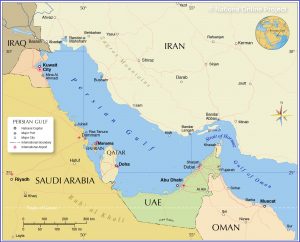Persian Gulf and its significance
 About Persian Gulf:
About Persian Gulf:
- Persian Gulf is a body of water shared by 8 countries (Bahrain, Iran, Iraq, Kuwait, Oman, Qatar, Saudi Arabia, and the United Arab Emirates).
- These countries are major producers of crude oil and natural gas.
- This has made them geo politically significant.
- For collective security of this region an effort was attempted in 1975.
- It was not able to yield a desired outcome because of Iraq.
Security and Stability
- Great Britain withdrew British Forces in late 1960’s and gave independence to its protectorates along the East Coast of Arabian Peninsula.
- Given the Geo-Political significance and also to prevent the spread of Soviet Influence, United States decided to intervene in the gulf by building to regional allies – Iran and Saudi Arabia (Twin Pillar Approach)
- The Iranian Revolution put an end to the Twin Pillar approach and disturbed the strategic balance.
- However the Iran – Iraq war gave an opportunity to the US to intervene and ensure security and stability in that region by sending a peace keeping force via UN Security Council Resolution.
Framework for Stability and Security:
The essential ingredients of such a framework would thus be to ensure:
- Conditions of peace and stability in individual littoral states
- Freedom to all states of the Gulf littoral to exploit their hydrocarbon and other natural resources and export them
- Freedom of commercial shipping in international waters of the Persian Gulf
- Freedom of access to, and outlet from, Gulf waters through the Strait of Hormuz
- Prevention of conflict that may impinge on the freedom of trade and shipping
- Prevention of emergence of conditions that may impinge on any of these considerations.
Gulf Cooperation Council
- It is a Regional Intergovernmental political and economic union consisting of all Arab States of the Persian Gulf except Iraq, namely: Baharin, Kuwait, Oman, Qatar, Saudi Arabia, and the United Arab Emirates
- It was signed on 25 May 1981.
- Objective: coordination, integration and interconnection among the Member States in all fields in order to achieve unity
- GCC acts as an answer to the challenges of security and economic development in the area.
- It also aims at fulfilment of the aspirations of its citizens towards some sort of Arab regional unity.
Declining US Commitment
- Geopolitical factors and conflicts elsewhere in the West Asian region — Yemen, Syria, Libya — aggravated global and regional relationships
- It has hampered a modus vivendi (an arrangement or agreement allowing conflicting parties to coexist peacefully, either indefinitely or until a final settlement is reached) in U.S.-Iran relations that was to be premised on the multilateral agreement on Iran’s nuclear programme agreed to by western powers and the Obama Administration but disowned by U.S. President Donald Trump
- Perceptions of declining U.S. commitment to sub-regional security have been articulated in recent months amid hints of changing priorities.
- This is reported to have caused disquiet in some, perhaps all, members of the GCC, the hub of whose security concern remains pivoted on an Iranian threat (political and ideological rather than territorial) and an American insurance to deter it based on a convergence of interests in which oil, trade, arms purchases, etc have a role along with wider U.S. regional and global determinants.
An Evolving Transformation
- GCC has divisions within the organisation
- These have been aggravated by the global economic crisis, the immediate and longer term impact of COVID-19 on regional economies, the problems in the Organization of the Petroleum Exporting Countries (OPEC), and the decline in oil prices.
- Saudi Arabia is a fading power, UAE, Qatar and Iran are emerging as the new regional leaders and Oman and Iraq will have to struggle to retain their sovereign identities.
- The GCC is effectively ended, and OPEC is becoming irrelevant as oil policy moves to a global condominium.
- Persian Gulf for at least three generations is in the midst of a fundamental transformation.’
India’s ties
- The bilateral relationship, economic and political, with the GCC has blossomed in recent years. The governments are India-friendly and Indian-friendly and appreciate the benefits of a wide-ranging relationship.
- This is well reflected in the bilateral trade of around $121 billion and remittances of $49 billion from a workforce of over nine million. GCC suppliers account for around 34% of our crude imports and national oil companies in Saudi Arabia and Abu Dhabi are partners in a $44 billion investment in the giant Ratnagiri oil refinery.
- In addition, Saudi Aramco is reported to take a 20% stake in Reliance oil-to-chemicals business.
- The current adverse impact of the pandemic on our economic relations with the GCC countries has now become a matter of concern.
- The relationship with Iran, complex at all times and more so recently on account of overt American pressure, has economic potential and geopolitical relevance on account of its actual or alleged role in Pakistan and Afghanistan.
- Indian interests do not entail power projection; they necessitate in their totality, peace and regional stability, freedom of navigation and access to the region’s markets in terms of trade, technology and manpower resources.
Subscribe
Login
0 Comments
